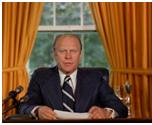Widgetized Section
Go to Admin » Appearance » Widgets » and move Gabfire Widget: Social into that MastheadOverlay zone
What Makes a Good Leader?
The views expressed are those of the author and do not necessarily reflect the views of ASPA as an organization.
By Terry Newell
November 3, 2015
 On Sept. 8, 1974, in front of an Oval Office camera, President Gerald Ford pardoned Richard Nixon. In office just 31 days after Nixon had resigned, Ford’s approval rating plunged from 71 to 42 percent by the end of the year. Letters and calls to the White House ran 6:1 against his decision. Two years later, he lost the presidency to Jimmy Carter. The public judged Ford a failed leader. But was he?
On Sept. 8, 1974, in front of an Oval Office camera, President Gerald Ford pardoned Richard Nixon. In office just 31 days after Nixon had resigned, Ford’s approval rating plunged from 71 to 42 percent by the end of the year. Letters and calls to the White House ran 6:1 against his decision. Two years later, he lost the presidency to Jimmy Carter. The public judged Ford a failed leader. But was he?
The Judgment of History
Just before the 1976 election, 55 percent of Americans said the pardon was wrong. By 1986, 54 percent said it was the right thing to do. The first words of President Carter’s inaugural address were, “For myself and for our nation, I want to thank my predecessor for all he has done to heal our land.” On Aug. 11, 1999, President Clinton awarded Ford the Presidential Medal of Freedom, saying, “He guided our nation toward reconciliation and a re-established confidence in our government.” On Oct. 27, 1999, Ford received the Congressional Gold Medal for helping heal “a nation in torment.” On May 21, 2001, Sen. Ted Kennedy presented a John F. Kennedy Foundation “Profile in Courage” Award to Ford, saying, “I was one of those who spoke out against his action then. But time has a way of clarifying past events, and now we see that President Ford was right.”
In reality, Ford did some things right and some things wrong. Understanding what they were may help us become better leaders.
What Went Wrong
Ford revealed his plan to pardon Nixon to only a few intimates. He ignored their warnings about the negative public reaction, which he thought would be short-lived. His press secretary, who did not learn about the pardon until the last minute, resigned in protest. Ford did not brief congressional leaders of either party on what he planned to do, thus announcing the pardon without any orchestrated political support.
The rationale in his pardon speech was confusing. It cited a litany of legal reasons to justify his action, expressed concern for Nixon’s health and buried the most important argument for the pardon—to restore “domestic tranquility”—deep in the speech. Ford had not planned any public campaign to explain himself.
What Went Right
Ford did two things right. First, he made his decision with the interest of the nation in mind, not his political future. Healing was essential. Absent the pardon, the nation would be consumed with Nixon’s indictment and trial for years. Ending the Vietnam War and dealing with stagflation were issues that were more important. In working on his autobiography, A Time to Heal, Ford had written to an assistant: “A politician is interested in the next election. A statesman is concerned about the next generation.” Ford practiced statesmanship.
Second, Ford called upon the character of the American people, what Lincoln referred to as “the better angels of our nature.” He asked them to balance their desire for justice with the need for mercy. It would have been easy for him (and perhaps secured his election in 1976) to join the “let’s get Nixon” bandwagon. He did not have it in him. Ford was a humble and forgiving person. He found it in his heart to forgive Nixon, who had lied to him as well as everyone else. He believed that the nation could—or at least ought to—do the same thing.
What Does This Mean for Leadership?
“Character is the only secure foundation of the state,” Calvin Coolidge said in his presidency, which followed the scandal-plagued Harding Administration. A leader may have all sorts of skills (competency lists are full of them), but a leader who lacks character substitutes hubris for humility and forfeits the trust without which it is impossible to lead. Ford had character. This was an essential quality after Nixon and the public admired him for it. Despite the pardon, he only lost to Carter by a narrow margin.
Character, of course, is not enough. Ford had never held an executive position before becoming president. He had not mastered the techniques of planning and conducting a public campaign in support of his goals and he was not a good public speaker. In essence, he did not recognize that his new job called for new skills and that what had worked before might not work now. He also needed to encourage and listen to dissent within his inner circle. Good advisors are not always right, but they usually have important points of view.
Finally, if the character of a leader matters, so does the character of followers. Most people want to do the right thing. A key task of leadership is to help them see what that is. Ford worked through the ethical dilemma he faced (pardon Nixon or let him stand trial), but it took the public a decade to gain the emotional distance to do the same. A leader needs to provide more help in that process to retain the legitimacy essential to lead.
Author: Terry Newell is president of Leadership for a Responsible Society and former dean of faculty at the Federal Executive Institute. He can be reached at [email protected].


 (1 votes, average: 4.00 out of 5)
(1 votes, average: 4.00 out of 5)
Follow Us!